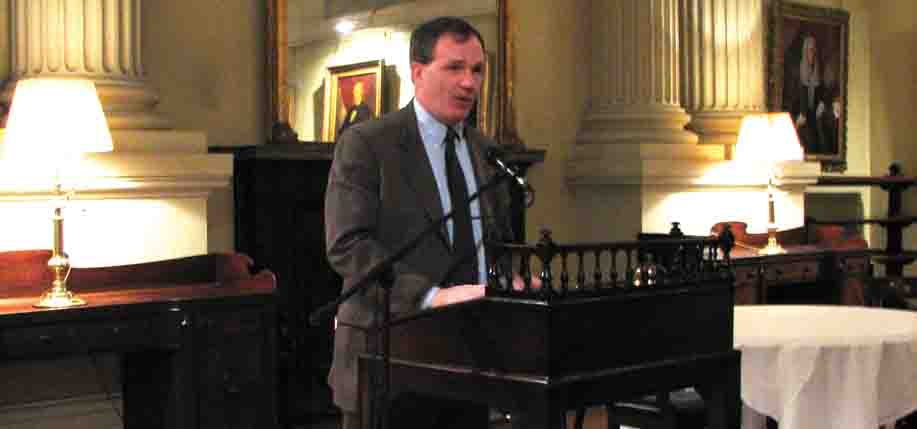Fresh from securing a conviction of Vice President Dick Cheney’s chief of staff Scooter Libby, Chicago federal prosecutor Patrick Fitzgerald appeared in Dublin the day before St. Patrick’s Day to talk about international prosecution of crime.
“We used to think of prosecutions of conduct happening outside the United States as coming once in a blue moon, but I think we’re going to start seeing this a lot more frequently,” Fitzgerald told a gathering of 100 mostly American lawyers at a seminar at University College Dublin.
American prosecutors increasingly have to be aware of other countries’ laws, Fitzgerald said. Fitzgerald’s office played a back-up role in the Irish government’s prosecution of Real IRA leader Michael McKevitt, who was brought down by Chicago mole David Rupert.
New technology means that the duty to keep abreast of other countries’ laws is more important than ever, Fitzgerald said. A prosecutor trying to go after a child molester who puts footage of his actions on the Internet needs to be familiar with the laws of the country in which the transmission originates, he said.
When Fitzgerald went to Kenya in 1998 to investigate the bombing of the U.S. Embassy there, he and his team decided to follow both American and Kenyan law until they decided which country they would file charges in.
“If there were two ways of doing it, we would do it the harder way so it would stand up in court in either place,” he said.
That meant that instead of letting a witness sit behind a one-way mirror and point out a suspect from a lineup of six people, as U.S. law requires, witnesses had to come face-to-face with a lineup of nine people, then walk up and place their hand on the shoulder of the suspect they identified, as required under Kenyan law.
Kenya does not guarantee suspects the right to an attorney, and the New York judge who tried the case was not satisfied Fitzgerald’s team had satisfied their obligation under American law to inform the suspect of his right to an attorney and so dismissed some parts of the man’s confession.
But both suspects were convicted anyway. Fitzgerald has something of a dragon-slayer reputation, from being the one who drafted the indictment of Osama bin Ladin 10 years ago, to convicting former Illinois Gov. George Ryan and Mayor Richard M. Daley’s patronage chief Robert Sorich of corruption.
Fitzgerald stopped short of indicting President Bush’s deputy chief of staff Karl Rove, credited with being the mastermind of Bush’s two campaigns for the White House, in the Libby prosecution. Libby was convicted of lying about disclosing the CIA credentials of a wife of a man who criticized the war in Iraq.
More than 100 American and Irish lawyers and judges including former Irish Supreme Court Justice Hugh O’Flaherty and high court judge Vivian Lavin attended and spoke at the series of meetings at UCD and the Kings Inn over the weekend organized by the Chicago Bar Association, including many attorneys who practice in both countries. Many of the questions dealt with the division of labor between solicitors — who prepare cases — and barristers — who argue them in court. The division does not happen in the United States.
Chicago Bar Association President Kevin Durkin has traveled the world representing families of people who have been killed in airplane crashes as part of his job at the Clifford Law Offices.
“It’s essential that I understand the laws of different countries in representing my clients,” Durkin said.
To maintain their licenses to practice law in the state of Illinois, Fitzgerald and the judges must take 10 hours of “continuing legal education” every year. The seminar fulfilled six of those hours and allowed the attorneys to be in Dublin for St. Patrick’s Day, in many cases meeting up with cousins, as Fitzgerald did.
Fitzgerald was one of the 63 percent of American lawyers who took no international law class in law school.
“I thought that was for students who studied Spanish or French. When you’re from Brooklyn, you’re working on English as your first language,” he quipped.
After the seminar, Fitzgerald flew back to Chicago to watch as his deputies gave opening statements in the criminal trial of Lord Conrad Black, former owner of the Daily Telegraph in London, the Chicago Sun-Times, the Jerusalem Post and the National Post in Toronto.
Two days after Fitzgerald returned to Chicago from Dublin, news reports surfaced that one of Attorney General Alberto Gonzales’ deputies had ranked Fitzgerald among prosecutors who had “not distinguished themselves.” Fitzgerald refused to comment on the report, but one of his top deputies, Assistant U.S. Attorney Patrick Collins, said upon his retirement from the office a few days later that he was “disappointed” in Gonzales for not denouncing the dubious rating.


Leave a Reply